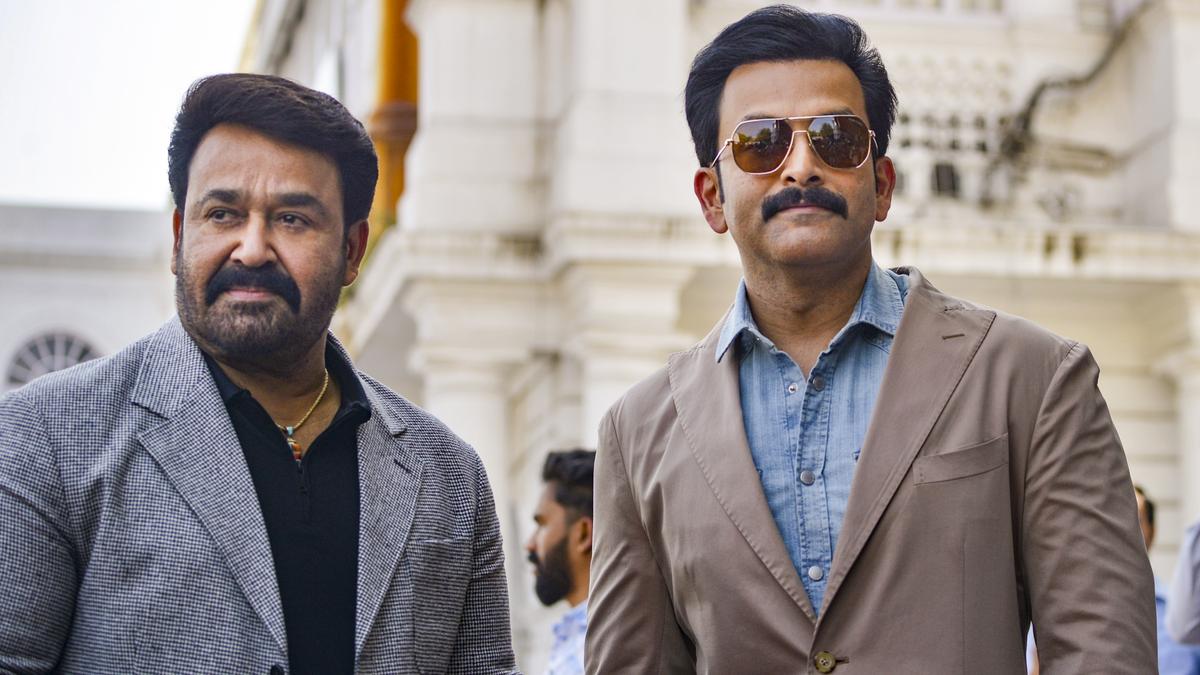Malayalam film actor Mohanlal with actor and director Prithviraj Sukumaran during a press meet for their film ‘L2: Empuraan’, in New Delhi.
| Photo Credit: PTI
The most prevalent term in Kerala this week is probably ‘voluntary cuts’. Used in reference to the several cuts that the makers of the film, L2: Empuraan, were forced to carry out, the term suggests that they willingly did so, to improve the film. It effectively hides the virulent hate campaign and unseen pressures that culminated in the decision, just three days after the film’s release.
Empuraan, directed by Prithviraj Sukumaran and starring Mohanlal, begins with a 15-minute sequence of a communal flare-up in India in 2002. While the images in the title sequences appear to be referencing the burning of a coach of the Sabarmati Express carrying saffron-clad men, the opening scenes depict mob violence in which several Muslims are killed, a reference to the Gujarat pogrom. Some sequences seem to refer to the Bilkis Bano case in which 11 men were convicted for the gang-rape and murder of several members of Ms. Bano’s family. Baba Bajrangi, the antagonist who leads the mob in the film, is reminiscent of Bajrang Dal leader Babu Bajrangi, who was sentenced to life imprisonment for having masterminded the Naroda Patiya massacre.
While independent cinema has always been forthright with its political commentary, which is often ignored due to the limited reach of these films, mainstream cinema, by design, rarely ruffles feathers. This week, though, a few courageous scenes in an otherwise lazily written commercial film appear to have shaken the right wing. The Kerala unit of the Bharatiya Janata Party (BJP), which initially appeared to distance itself from the online hate campaigns against Empuraan, soon changed tack, with some of its leaders viciously attacking the makers and even their family members. The BJP State vice president, B. Gopalakrishnan, termed film producer Supriya Menon, who is Mr. Sukumaran’s spouse, an ‘urban Naxal’. The Rashtriya Swayamsevak Sangh’s mouthpiece, Organiser, published three articles against the film. One of them specifically targeted Mr. Sukumaran, calling him the “voice of anti-nationals”.
The entire controversy over references in the film to relatively recent events in India is playing out at a time when the Hindi film industry is busy churning out propaganda films that advocate for the Central government’s concerns. For instance, The Kerala Story was called out for maligning the State with false claims and hateful references. But none of these films had to face the scissors of the Central Board of Film Certification (CBFC). On the contrary, many of them were provided tax cuts by BJP-led State governments and ran in theatres for weeks. Censorship and bans seem to apply only to films that run counter to the acceptable narrative. The CBFC recently denied certification to the internationally acclaimed film Santosh, objecting to its searing portrayal of police brutality, caste discrimination, and misogyny.
Mr. Mohanlal’s apology came as a disappointment for many, especially because it came on the heels of Chief Minister Pinarayi Vijayan and the Leader of the Opposition V.D. Satheesan expressing solidarity with the film and its makers. Mr. Vijayan’s party, the Communist Party of India (Marxist), is also lampooned in the film. He made a political statement by watching the film with his family and said that the Sangh Parivar’s anger stems from the fact that Empuraan references one of the “most brutal genocides the country has ever seen”.
The relentless online hounding of those associated with the film appears to be aimed at sending a message to the entire Malayalam film industry, which has been producing films that are not entirely to the liking of the powers that be. The apology from one of the biggest stars of the industry and the ‘voluntary cuts’ are bound to have a chilling effect on other filmmakers and writers, who might resort to self-censorship. The climate of fear is also reflected in the silence of the rest of the film fraternity, including film organisations and stars, who are otherwise vocal about issues in the industry.
For an industry which has made hard-hitting films such as Nirmalyam and The Great Indian Kitchen, this is a critical juncture where the decisions taken may decide its future trajectory. If there is no united push back against attempts to dictate what can be depicted, we might soon be watching an assembly line of films that conform to a colourless and monolithic vision of society.
Published – April 02, 2025 12:15 am IST
